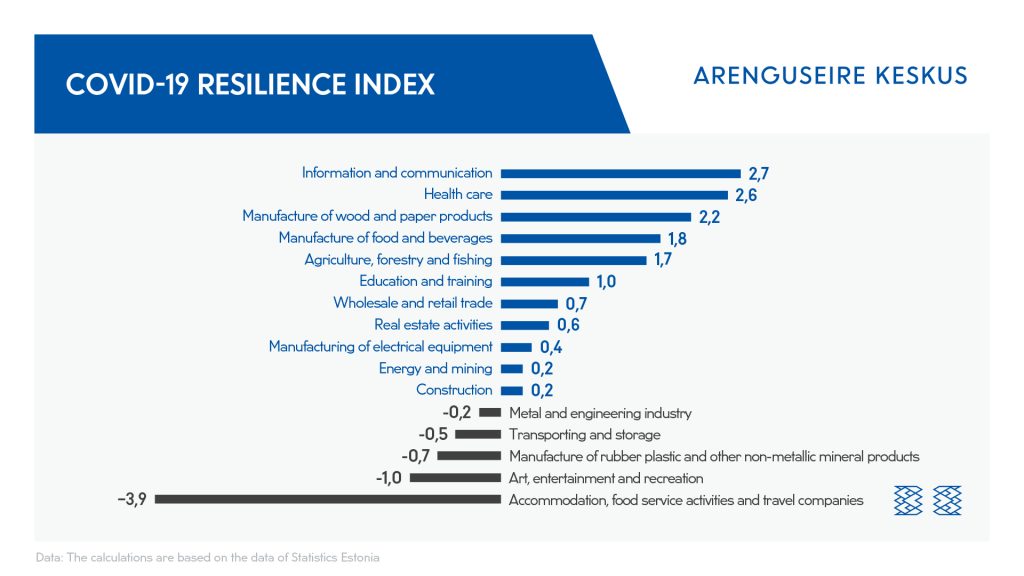Corona pandemic may jeopardise food industries export
The Corona pandemic may increase hidden protectionism in the export markets of the Estonian food industries, the Foresight Centre report “The Impact of the Virus Crisis on the Estonian Economy. Scenarios up to 2030” shows. During the first wave of the virus, the monthly turnover in the manufacture of beverages dropped by 20.6%; the greatest decline in the manufacture of food products, 6.9%, took place in April.

“The food industry has survived the corona pandemic well and has been relatively stable,” Expert of the Foresight Centre Uku Varblane said. “The impact of the crisis reached the food production sector first through panic buying, which was followed by a slight decrease in April, but the monthly turnovers restored rapidly. It was harder for the beverages industry, where the monthly turnover dropped by one fifth in April and has not yet recovered.”
Varblane said that the marketing problems of the food sector had been caused by the decrease in sales to hotels and restaurants, and sometimes circular indebtedness between companies had emerged because of that. “At the beginning of the crisis, the cereals and pasta sector fared well, but the sales may drop there soon because people are using the stocks they have amassed. The producers of pastries suffered a great blow in the crisis because a large part of their market disappeared with the closing of cafés and restaurants,” Varblane added.
Uku Varblane believes that the food industries are facing the second wave of the virus in a good shape, but uncertainty prevails in a number of factors relating to production. “For example, the further spread of the virus, the decisions regarding foreign labour, an increase in unemployment that may result in decreased consumption as well as the obligations arising from the European Union’s green transition,” Varblane said and added that the growth of protectionism in export markets was also becoming an increasing risk. “In view of the crisis, increasingly more emphasis will be laid on the origin of food, and this will create a negative background for imported goods, which will also worsen Estonia’s export opportunities,” Varblane explained. “Small countries that do not have famous food brands that everybody knows and buys stand to lose the most from protectionism.”
2.9% of workers or around 16,000 persons were employed in food and beverages industry in 2019, and 1.9% of the added value of the whole economy (458 million euro in current prices) was generated in the sector in 2019. The manufacture of food products and beverages accounts for 2.8% of the Estonian export.
Due to the virus crisis, this April, the monthly turnover of enterprises engaged in the production of foodstuffs decreased by up to 6.9% compared to the previous year, but in June, it increased by 4.2% compared to the previous year. For enterprises engaged in the production of beverages, the largest decrease in turnover relating to the virus crisis was in April, when the monthly turnover was 20.6% lower than in the previous year.
According to the COVID-19 resilience index developed by the Foresight Centre, the food and beverages industry ranks fourth (1.8 points) by resilience to the crisis among the 17 economic sectors.
COVID-19 resilience index
The COVID-19 resilience index measures the extent to which economic sectors are affected by the coronavirus crisis. The index is based on various economic indicators of companies. The value of the index is between -5 (the largest negative impact) and +5 (the smallest negative impact). The index takes into account the changes in the turnover of companies (total turnover in March–August 2020 compared with the same period the year before) in the economic sector, changes in their number of employees in comparison to 2019 and the dynamics after the emergency situation, changes in labour expenses, and changes in the profit and investments of companies in comparison to the same period last year.

BACKGROUND
- The Foresight Centre started publishing surveys of the impact of the virus crisis on economic sectors on 17 November. On 24 November, the Centre will publish a brief summary on the electronics and electrical equipment industry.
- The calculations and figures of the surveys use the data of Statistics Estonia. The descriptions of development perspectives are based on the interviews with the representatives of sectoral associations and the focus group interviews conducted in cooperation with the research group of the Estonian Qualifications Authority OSKA. The Foresight Centre will present the scenarios for exiting the virus crisis at the beginning of December. Read more: https://arenguseire.ee/en/uurimissuunad/impact-of-covid-19/
- The impact of COVID-19 on the changes in employment and skills in different industries is covered in OSKA’s special survey, which will be published in early 2021.
The Foresight Centre is a think tank at the Chancellery of the Riigikogu that analyses long-term developments in society and economy. The Centre conducts research projects to analyse the long-term developments in Estonian society and to identify new trends and development directions.
Latest news
-
27.06 2025Current low birth rate will lead to up to 1.3 billion euros less tax revenue in the future
In its new short report “The impact of population ageing and low birth rate on long-term state revenue and expenditure”, the Foresight Centre notes that the lower than projected birth rate will reduce government spending on family policy and education, but in the long term, it will mean up to 1.3 billion euros less in tax revenue.

 An independent think tank at the Riigikogu
An independent think tank at the Riigikogu 